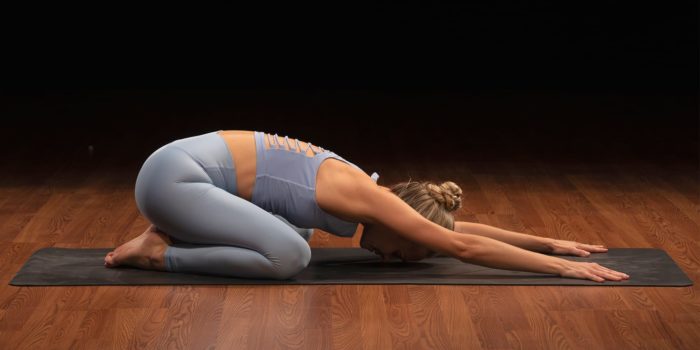After building up a good sweat during a long yoga class, I like to put students right into pigeon pose. But this isn’t the only hip-opening option before savasana: The glute stretch from pigeon pose pairs perfectly with the inner thigh stretch of frog pose or frog stretch (mandukasana in Sanskrit).
Considering how much time we spend seated, our glutes are inactive for large portions of our days, which can cause tightness. Inner thighs suffer a similar fate, yet are rarely targeted for a stretch like the one enjoyed in frog pose. That ends now!
Frog Pose (Mandukasana): Step-by-Step Instructions
- Start in tabletop position: Get on all fours, with your hands directly below your shoulders and your knees directly below your hips.
- Slowly begin walking your knees out to the sides, keeping your feet flexed and your ankles in line with your knees.
- Keeping your spine neutral, let your pelvis sink as the inside edges of your feet touch the mat. Come down onto your forearms, if comfortable.
- Let gravity do the work; just breathe and feel the stretch for five breaths.
- To come out of the pose, gently rock your hips forward, walk your knees in, and press from your palms back up to the starting position.
How to Make Frog Pose Easier
Mandukasana is an intense inner-thigh stretch, so it’s important to avoid going too deep before you’re ready. There are a few ways to minimize the stretch without reducing its effectiveness.
- Turn frog pose into a restorative posture. Place a firm pillow or bolster between your legs and lower your chest onto it.
- Place blocks under your hips to support you as you lower into mandukasana.
- The simplest way to make frog stretch easier is to withhold lowering yourself as far. If your breath feels short, you may have gone too deep.
How to Deepen Frog Pose
For an advanced yoga practitioner, the inner thighs might be less tight than for others. There are a few ways you can intensify mandukasana.
- Lower your body farther, bringing your pubic bones to the floor.
- Lightly press your hips back toward your heels to intensify the inner-thigh stretch.
Beginner Tips for Doing Frog Pose

If you’re practicing frog pose for the first time, here are some ways to prepare for and get the most out of this stretch.
- Before getting into frog pose, warm up your knees in child’s pose.
- Don’t be afraid to fidget. It’s OK to move back and forth gently to open your hips.
- You can also lightly cat and cow your spine to find a more comfortable position.
- If you struggle with knee pain, place a blanket under your knees.
Benefits of Frog Pose
Mandukasana is chiefly a hip opener that really encourages mindful breathing. According to BODi Vice President of Fitness Programming Stephanie Saunders, “This deep stretch can be an exercise in patience, as most people want to get out of it after about 30 seconds. However, if you breathe into it, and let gravity do the work, you will be surprised at how much your hips and groin can open.
“It can be an awkward position, but it requires little effort once you’re in it. And if you aren’t sure of your positioning, using a wall against which to press your feet will not only assist in your alignment, but can help to deepen the stretch as well.”
The post How to Do Frog Pose in Yoga (Mandukasana) appeared first on BODi.


0 Comments